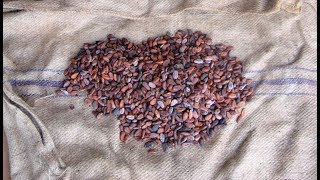Hari Sreenivasan: Today is Easter, and as is the case for many holidays, Americans often celebrate with chocolate. American demand is high. More chocolate is sold here than in any other country in the world. And there are millions of cocoa growers providing the supply, the majority of whom come from just two countries in west africa: Ivory Coast and Ghana. A new book, "Cocoa," looks at the difficult lives of those growers and their role in the cocoa industry. It was written by Kristy Leissle, who is on the faculty at the university of washington, and is currently based in Accra, Ghana. She recently spoke with newshour weekend's Megan Thompson.
Megan Thompson: Who are these cocoa bean growers? What conditions do they live in?
Kristy Leissle: Yeah, they're all-- 90%, 95% are small holder farmers, which means they own very little, small plots of land, and they grow a tiny fraction, each of them, of the total crop, which is over four million metric tons. So, each one of those cocoa farmers grows just a little bit of that. They live in really challenging conditions. The infrastructure that we enjoy here is not present in the areas where cocoa farmers live. So things like paved roads and running water and electricity, usually they don't enjoy those things. So it's a very challenging life.
Megan Thompson: What kind of income are these growers earning?
Kristy Leissle: It's hard to give you an average because there's such a range in how much farmers can grow. Some of the work that I've done has found between $2 and $3 a day, if you average it over time. It's also a little bit misleading to say $2 or $3 a day, because each cocoa farming household has a number of people who live in it, and so that income has to really be shared amongst them.

Megan Thompson: So, the value of the cocoa beans that these growers produce is estimated to be around $8 billion a year. But the value of the chocolate that those beans are used to make is estimated to be around $100 billion a year. Can you just talk about that market?
Kristy Leissle: You know, as you said, there's five million cocoa growers in the world, each one of them capturing such a tiny share of value of the crop that they grow. That means that they just don't have a lot of power, they have very little influence in this industry. Even collectively, it's been really hard for farmers to come together and organize, and exert themselves as a political force. They're far too spread out in remote, rural regions, and it's hard for them to come together in any way, exert themselves meaningfully.
Megan Thompson: You write in the book about this emotional relationship that we have with chocolate, and how that might kind of obscure the story behind it.
Kristy Leissle: I do think we have such an emotional relationship with chocolate, and that was something that we really invented. And it was the marketing and advertising of the early industrial chocolate bar and candies that gave us that relationship with chocolate. We associate it now with romance, and love, and holidays and celebrations. Chocolate is an everyday luxury, and, you know, here in north america, in europe, increasingly in Asia, we can buy a chocolate bar with very little impact on our disposable income. It's a very affordable luxury.
Megan Thompson: You talk about buying chocolate. I know when I walk into a store, I sometimes see chocolate that's labeled "fair trade," or "direct trade." I know some of the big chocolate companies have programs that they tout, supporting farmers and, you know, helping with sustainability. I mean, how much do we know about how much of an impact all of these programs have, and, I mean, what would you advise a consumer to do?
Kristy Leissle: When you are using a label like fair trade, there is a third party, not the cocoa farmer, not the chocolate maker, who says, these are the rules to play by, this is what is just, and you can verify that what is happening is what we say is happening. When a chocolate company adopts its own internal certification program, it is a lot harder to verify what they are doing, and so we have seen that shift in the industry. What I do say to people is, we are at a stage where we know so little about where chocolate comes from, so learn as much as you can, inform yourself, ask the companies that you buy chocolate from, ask the retailers to tell you where that cocoa came from.
Megan Thompson: All right, Kristy Leissle, thank you so much for being here.
Kristy Leissle: Thank you so much for having me.











